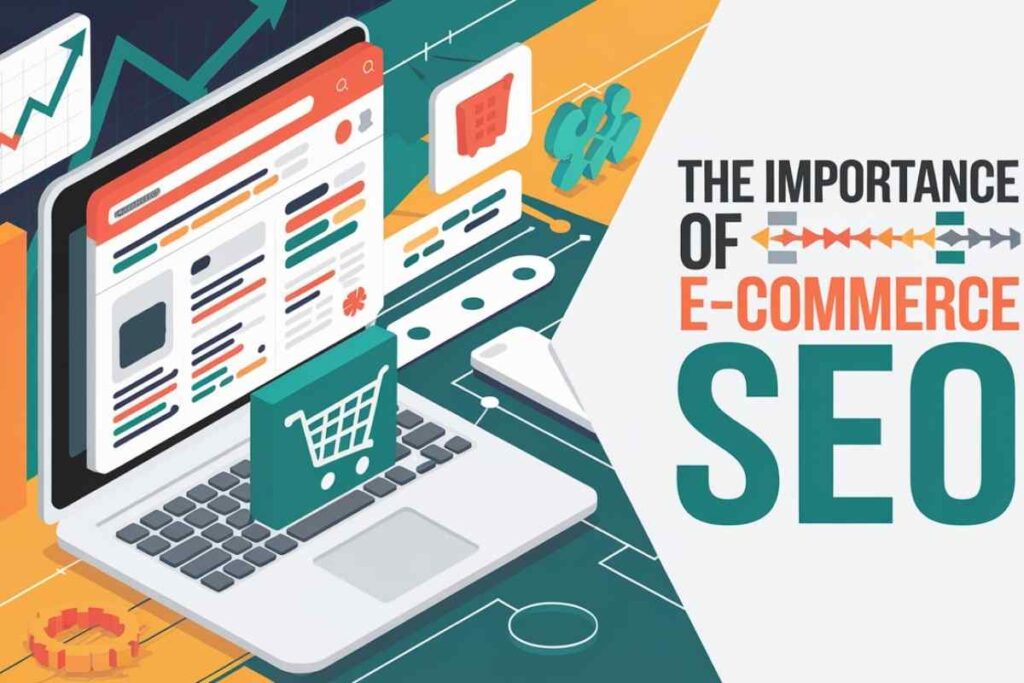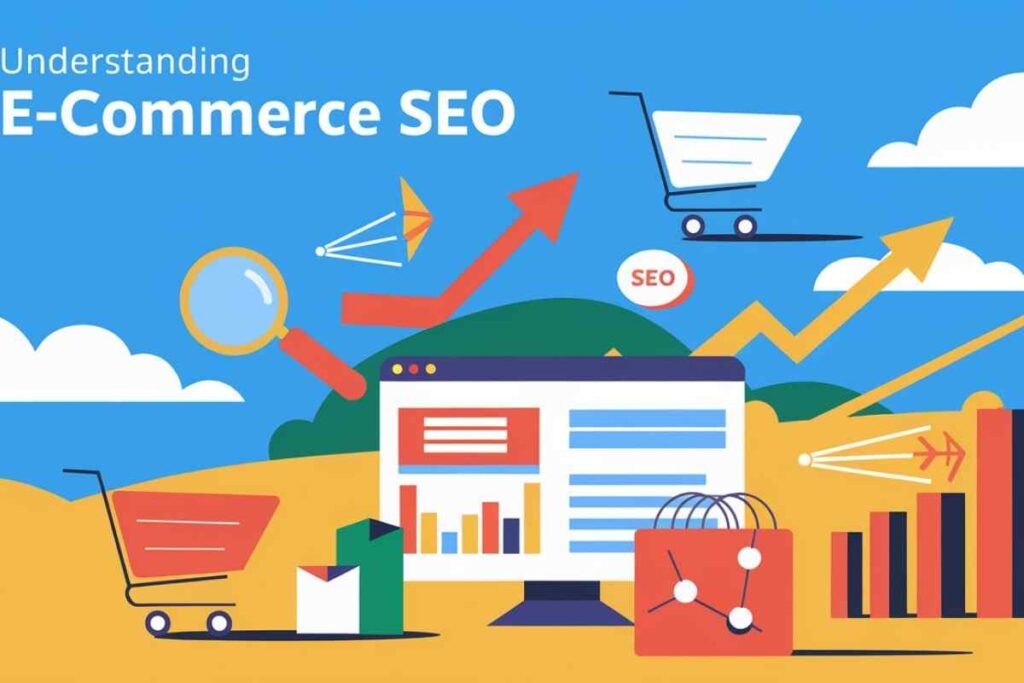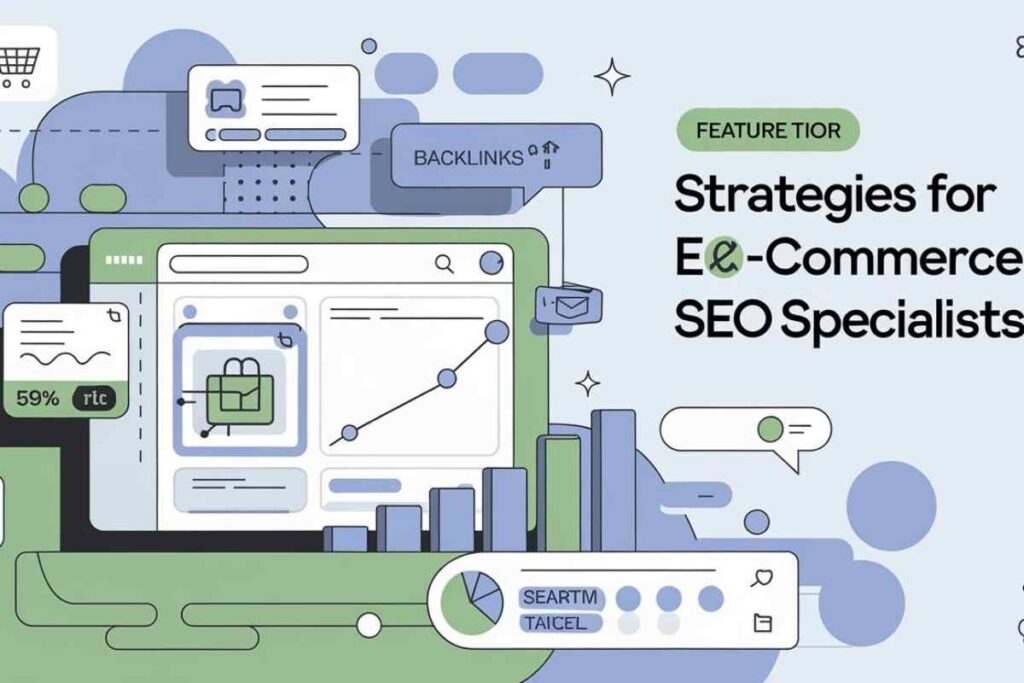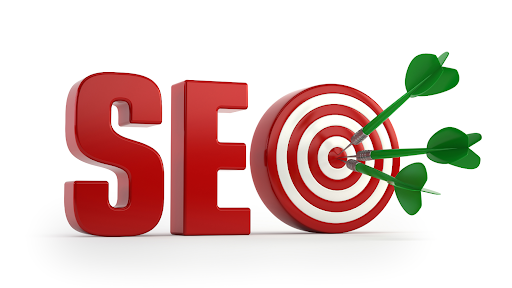E-commerce SEO, or E-commerce Search Engine Optimization, is a crucial marketing technique that enhances the visibility and rankings of online stores on search engine results pages (SERPs).
An ecommerce SEO specialist plays a vital role in implementing these strategies to ensure that businesses can optimize various aspects of their e-commerce websites—such as product pages, category pages, and content—to attract more organic traffic and ultimately increase sales.
This article delves into effective strategies and components of e-commerce SEO, emphasizing its importance for online businesses.
The Importance of E-commerce SEO for Online Businesses

ecommerce seo specialist plays a vital role in driving traffic, increasing visibility, and boosting sales for online businesses. Here are some key reasons why e-commerce SEO is essential:
1. Driving Brand Awareness
E-commerce SEO helps ensure that your website appears on the first page of search results, attracting potential customers and improving click-through rates.
2. Filling the Marketing Funnel
SEO is critical for driving traffic at various marketing funnel stages, from awareness to interest and action, ultimately influencing shopper movement toward conversion.
3. Elevating Content
By targeting transactional keywords and enhancing content like blog posts and guides, e-commerce SEO leads to increased traffic and improved user engagement, all at minimal cost.
4. Expanding Remarketing Audiences
Driving organic search traffic allows businesses to build larger remarketing audiences for paid campaigns, increasing the chances of conversions.
5. Capturing Long-Tail Keywords
E-commerce sites can effectively target long-tail keywords, which may drive fewer searches individually but collectively represent a significant portion of total searches and often lead to higher conversion rates.
6. Improving User Experience
Optimizing websites based on keyword data and user behavior enhances usability, potentially improving rankings by providing what users are searching for quickly and effectively.
7. Lowering Paid Search Costs
Optimizing content for SEO also benefits paid search campaigns by improving Quality Scores, reducing click costs, and enhancing performance in both organic and paid search channels.
8. Creating Lasting Value
Unlike advertising campaigns that end once stopped, SEO is a long-term investment that continues to provide value through ongoing optimization efforts.
Understanding E-commerce SEO

ecommerce seo specialist involves specific strategies for online stores to enhance visibility and attract targeted traffic. Here are the key components:
Key Components of ecommerce seo specialist
1. Mastering Keywords Intensive keyword research tailored to product pages, category pages, and content pages is essential for matching potential customer searches effectively.
2. Prioritizing URLs Focusing on important pages while blocking irrelevant pages like shopping cart pages from search engine crawlers using robots.txt is crucial for effective SEO.
3. Site Structure A shallow site structure is essential to ensure easy navigation for customers and to pass authority effectively within the site.
4. Responsiveness Websites must be responsive across all devices to cater to the increasing trend of mobile shopping, as search engines penalize non-responsive sites in rankings.
5. Page Load Speed Optimizing page load times is critical, as slow speeds can deter potential customers and lead to higher bounce rates.
6. Image Optimization High-quality images are vital as they enhance user experience and can significantly influence purchasing decisions.
Strategies for E-commerce SEO Specialists

E-commerce SEO specialists employ various strategies to enhance the visibility and rankings of online stores. Here are some key strategies:
A. Keyword Research and Optimization
- Identifying Relevant Keywords: Focus on finding keywords potential customers use to search for products online.
- Implementing Keyword Optimization Techniques: Optimize product and category pages with relevant keywords that align with search intent.
B. On-Page Optimization
- Optimizing Product Pages: Create SEO-friendly URLs, meta tags, and descriptions that improve visibility on search engines.
- Creating SEO-Friendly URLs: Prioritize essential pages and block irrelevant ones from search engines using robots.txt.
C. Technical SEO for E-commerce
- Improving Site Speed and Mobile-Friendliness: Enhance site speed and ensure mobile responsiveness to cater to mobile shoppers.
- Implementing Structured Data Markup: Use structured data to provide search engines with detailed product information, enhancing visibility and leading to rich snippets.
D. Content Marketing for E-commerce
- Creating Engaging Product Descriptions and Blog Content: High-quality descriptions and engaging blog posts can attract organic traffic and improve user engagement.
- Leveraging Content for Organic Traffic: Align content with user search intent to drive traffic and conversions.
E. Link Building Strategies
- Building High-Quality Backlinks: Focus on acquiring backlinks from authoritative websites to improve site authority and boost rankings.
- Utilizing Influencer Partnerships: Leverage influencer partnerships to increase brand visibility and credibility.
F. Performance Tracking and Analytics
- Monitoring Key Metrics: Track essential metrics like traffic, conversions, and rankings to evaluate strategies’ effectiveness.
- Using Tools like Google Analytics: Gather insights into website performance and user behavior to continuously improve SEO efforts.
Future Trends in E-commerce SEO
The landscape of e-commerce SEO is continuously evolving due to advancements in technology and changes in consumer behavior. Here are some predictions and recommendations for staying ahead in the industry:
Predictions for the Evolving Landscape
- Advancements in AI and Natural Language Processing: These advancements will shape content creation, emphasizing expertise, authoritativeness, and trustworthiness (E-A-T).
- Search Intent as a Critical Influence: Understanding user intent will remain vital for effective keyword research and content creation.
- Mobile-First Approach: A mobile-first strategy will continue to be essential for enhancing user experience and search engine rankings.
Recommendations for Staying Ahead
- Focus on Content Quality: Create authentic, valuable content that aligns with user intent.
- Optimize for Search Intent: Prioritize understanding user intent in content creation to drive organic traffic effectively.
- Technical Optimization: Invest in technical SEO improvements to ensure a seamless user experience.
Conclusion
E-commerce SEO is a multifaceted approach essential for the success of online businesses. By implementing effective strategies focused on user intent, optimizing product pages, building quality backlinks, and staying updated with evolving trends, e-commerce specialists can significantly enhance their websites’ visibility and performance.
Hiring an ecommerce SEO specialist can significantly enhance your online store’s visibility, attract the right audience, and drive more sales. By implementing expert SEO strategies, you can stay ahead of the competition and achieve long-term success in the digital marketplace. Start optimizing today and watch your ecommerce business grow!
FAQS
What is E-commerce SEO?
E-commerce SEO refers to the process of optimizing an online store to improve its visibility on search engine results pages (SERPs), ultimately driving more organic traffic and increasing sales.
Why is E-commerce SEO important?
E-commerce SEO is crucial because it helps online businesses attract targeted traffic, improve brand awareness, enhance user experience, and lower marketing costs over time.
How can I improve my E-commerce SEO?
To improve E-commerce SEO, focus on keyword research, optimize product and category pages, enhance site speed and mobile responsiveness, and create engaging content.
What are long-tail keywords, and why are they important?
Long-tail keywords are longer, more specific search phrases that typically have lower competition but higher conversion rates. They help capture targeted traffic more effectively.
How does site speed affect E-commerce SEO?
Site speed is critical for E-commerce SEO because slower loading times can lead to higher bounce rates, negatively impacting rankings and user experience.
What role does mobile optimization play in E-commerce SEO?
Mobile optimization ensures that your website functions well on mobile devices, which is essential as a significant portion of online shopping occurs on smartphones. Search engines prioritize mobile-friendly sites in rankings.
How can content marketing enhance E-commerce SEO?
Content marketing enhances E-commerce SEO by providing valuable information to users, improving engagement, and attracting organic traffic through optimized blog posts and product descriptions.
What tools can I use to track my E-commerce SEO performance?
You can use tools like Google Analytics, Google Search Console, and SEMrush to track key metrics, monitor traffic, analyze user behavior, and evaluate the effectiveness of your SEO strategies.



